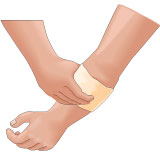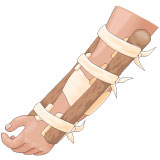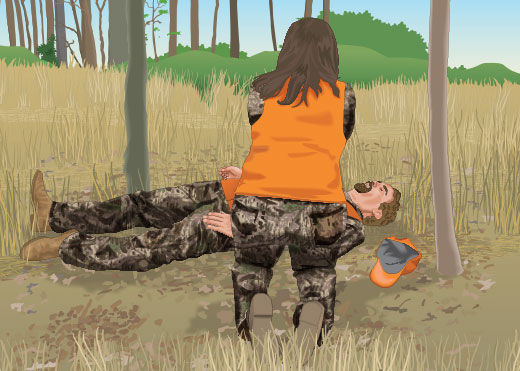What You Learned (cont.)

Hypothermia occurs when your body loses heat faster than it can produce it. Hypothermia is often caused by cold, wet conditions.
- To help prevent hypothermia, dress properly, avoid potentially dangerous weather conditions, and dry out as quickly as possible when you get wet.
- To treat the victim, find shelter, remove wet clothing, give warm liquids, and rewarm the person. Also contact emergency medical personnel to evacuate the victim to a hospital for treatment.

Frostbite occurs when tissue freezes.
- To prevent frostbite, avoid severe weather.
- To treat frostbite, warm the area with body heat and warm, dry clothing; move to a warm shelter, drink hot liquids, and get medical attention.

Heat exhaustion occurs when the core body temperature increases.
- To prevent heat exhaustion, drink plenty of water, take breaks while hiking, and remove layers of clothing as you get hotter.
- To treat heat exhaustion, move to a cooler place, drink water, and fan yourself.
Heat stroke can be fatal. To treat the victim, wrap in a sheet and soak with cool water, fan, and get to a hospital immediately.

Severe bleeding is a life-threatening medical emergency. To stop bleeding, apply direct pressure on the wound, cover it with a sterile gauze pad, and elevate the wounded area above the level of the heart if possible.

You can assume someone has a broken bone if pain lasts more than a few minutes, moving the injured area is difficult, or there is swelling in the injured area. If you have to transport the victim a long distance, don’t try to straighten the limb—splint it the way you found it.

First- and second-degree burns with closed blisters are best treated with cold water. Second- and third-degree burns with open blisters should be wrapped with a loose, dry dressing.

Get victims of carbon monoxide poisoning into fresh air immediately, and keep them lying quietly. Prompt medical care is essential.

Shock can result from any serious injury. To treat shock, keep the victim lying on his or her back, try to keep the victim calm and comfortable, and get medical help as quickly as possible.
A bullet striking the chest can cause a sucking chest wound. All chest injuries are very serious and need immediate medical attention.
Hunting from a tree stand puts you at risk. Plan what you will do if you should fall from your stand.

Most doctors agree that the best response to a snakebite is to rush the victim to a hospital emergency room. Do not try to remove poison from snakebites.

Every hunter should take a first-aid course and a course in cardiopulmonary resuscitation (CPR) to be prepared to handle outdoor emergencies. A prepared hunter also will carry a complete first-aid kit.